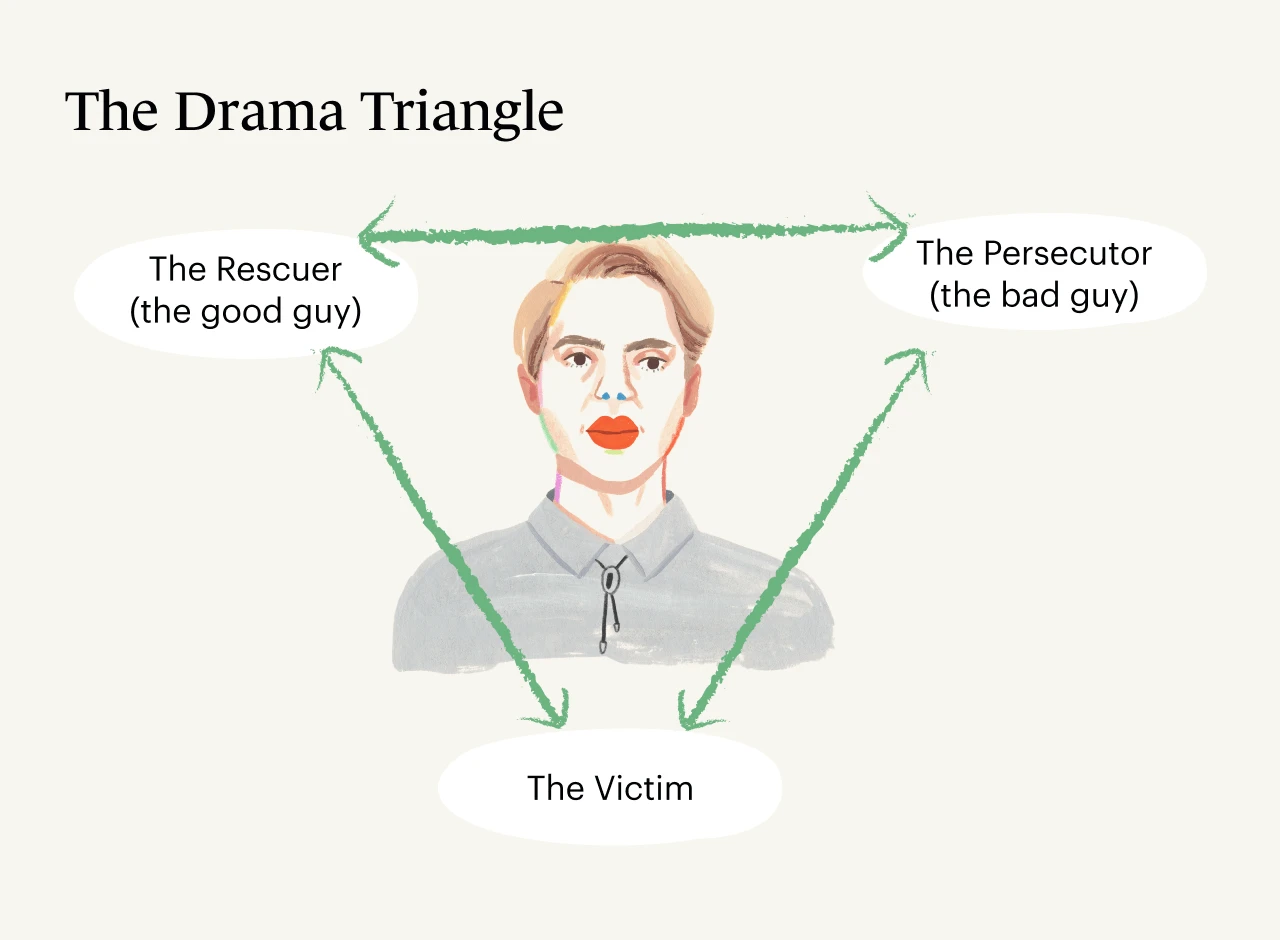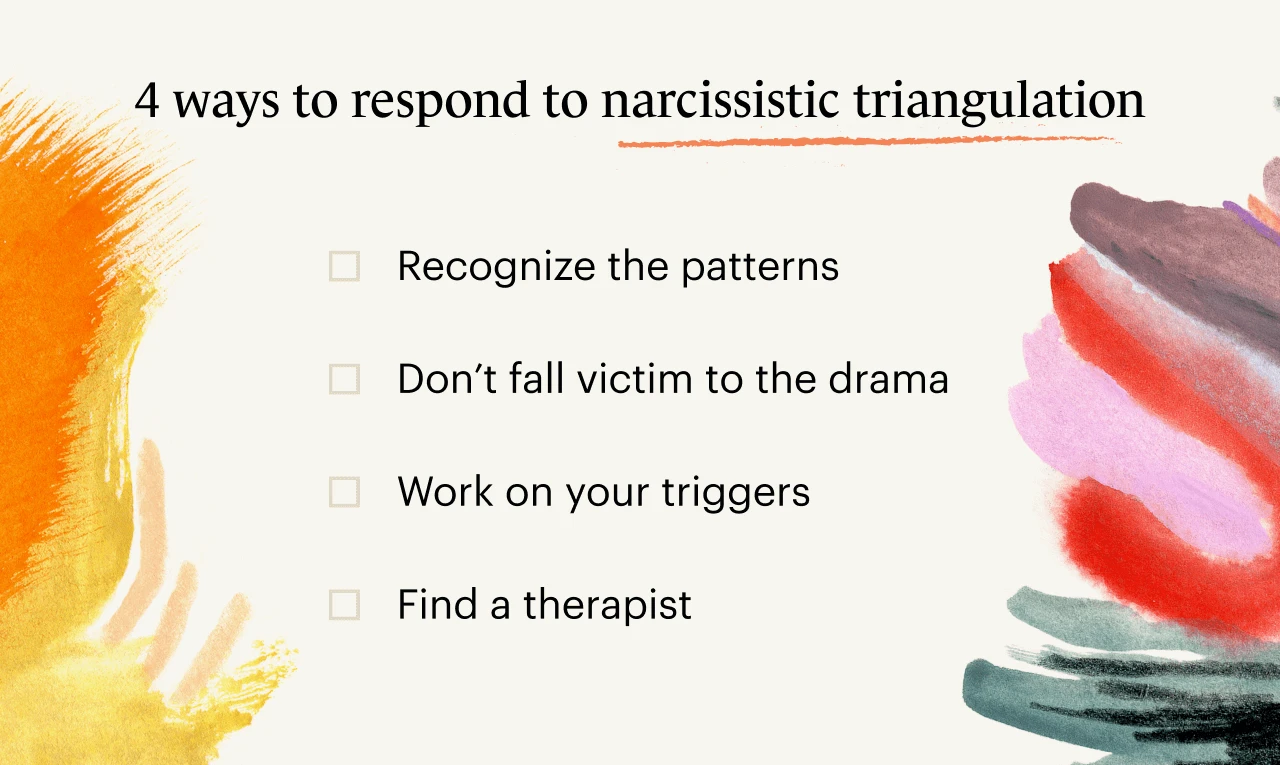You may have experienced narcissistic triangulation if any of these phrases sound familiar to you:
“Even my sister thinks you’re crazy”
“You never clean around the house, and we needed someone to step up, so my mom is coming over to help out each week.”
“Everyone else thinks I'm a great dad—you’re the only one who doesn’t think that.”
What's narcissistic triangulation?
Narcissistic triangulation is a common manipulative technique where narcissists use other people to create smear campaigns against their victims.
This type of emotional abuse is most common in people who have a Cluster B personality disorder, specifically narcissistic personality disorder (NPD).
The term triangulation was originally associated with family systems theory and Murray Bowen.
Bowen theorized that in dysfunctional families the family system will pull in a third person who can be used as a communicator or a messenger about some frustration or disapproval within the family.
Narcissistic triangulation is a tactic where narcissists use other people to create smear campaigns against their victims.
Although triangulation can be used by anyone and is not always intentional or malicious, it is a preferred tool of the narcissist to gain powerand control and to feel superior in the relationship with you.
When triangulation is used by a narcissist, it’s considered a form of emotional abuse.
The narcissist uses triangulation to pull in a third party to create conflicts to manipulate and control situations.
For example, a narcissistic partner may pull in another person who he knows will agree with him and disagree with you.
This ensures that the narcissist will win his argument against you and gain power and control over you.

The drama triangle of narcissistic triangulation
One of the best ways to describe narcissistic triangulation and illustrate this type of dysfunction to my therapy clients is through the work of Dr. Stephen Karpman’s Drama Triangle.
Karpman theorized that there are three roles in the toxic triangulation drama that appear consistently with narcissists.
The narcissist may shift quickly from role to role, although most of the time they will stay in the victim or persecutor role.
Particularly when the narcissist is playing the victim role, they will not hesitate to bring another person into the triangle, because they can gripe and complain to the third person in the triangle about how badly they are being treated by their partner.
The Persecutor (the bad guy)
Narcissists in this role are overt in their threats, criticism, and blame.
There is often no personal responsibility taken in this role.
The Rescuer (the good guy)
The narcissist will use this role when he is love bombing during the beginning of a relationship when he appears as your knight in shining armor, ready and willing to sweep you off your feet and fix all of your problems and concerns.
The Victim
Narcissists love to appear as the victim in the emotional triangle.
In this role, a narcissist will present himself as helpless or being taken advantage of.
This relieves him of any responsibility in the situation, and it sets the stage for someone else to be blamed.
Why do narcissists triangulate?
This seems like a lot of work, so why would a narcissist create these toxic emotional triangles?
Wouldn’t a narcissist get tired of all the drama triangulation creates?
Nope!
Narcissists live for drama. They even thrive on it.
Triangulation creates an illusion of superiority for the narcissist. Getting another person to agree with them validates a sense of being “right” or “winning.”
We know that narcissists derive their sense of self-worth, validation, and admiration from others. Narcissists require these elements from their environment to survive.
You may have heard this described as narcissistic supply.
Narcissists are addicted to this supply of external approval and as a result, spend endless amounts of time attempting to acquire it.
There are multiple ways to gain this supply, and narcissistic triangulation is definitely one of them.
Triangulation creates an illusion of superiority for the narcissist.
Getting another person to agree with them validates a sense of being “right” or “winning.”
They can also secure narcissistic supply through attention.
For example, if they are framing themselves in a “victim” role, they can gain sympathy, acceptance, and approval from the person in the “rescuer” role.
Because the narcissist is always seeking to be in control, bringing a third person into a conflict allows the narcissist to unite themself with another person so they are in the dominant position.
It will always be a situation of two against one.
This can all but ensure that the narcissist will win any argument—further fueling their arrogance and dominance.

How to respond to narcissistic triangulation
When I am working with my clients to heal from narcissistic abuse, the first step in their recovery is helping them understand what they have experienced.
In counseling my clients on the skills to respond to narcissistic triangulation or narcissistic abuse of any kind, I recommend the following steps:
1. Recognize the patterns
Becoming successful at dealing with narcissistic triangulation involves looking for the patterns in the narcissist’s behavior. Pay close attention to the signs and characteristics of each role in the drama triangle.
Notice if you are feeling pulled into one of the positions. Are you feeling exhausted (rescuer), like a bad guy (persecutor), or attacked (victim)? You may not have realized you have been pulled in until you are already there.
2. Don’t fall victim to the drama
Narcissists do not have effective problem-solving skills, so they typically create drama.
If you find yourself being seduced into or contemplating behavior you know to be unethical, immoral, or just plain wrong, you have walked into the drama. Saying no to these requests or invitations to toxic triangulation will keep you out of the drama.
3. Understand and acknowledge your triggers
Narcissists tend to seek out people who are vulnerable and empathetic.
While these are wonderful characteristics to have, these traits may attract manipulative people.
Consider identifying your triggers (vulnerabilities you may have) that the narcissists exploits.
Once you identify these, you can work on becoming non-reactive to the narcissist’s attempts at triangulation.
Use anti-triangulation terminology
Finally, here are some phrases you can use when dealing with a narcissist's toxic emotional triangulation:
“That has nothing to do with me.”
“I would rather not talk about people who are not here”
“It sounds like you have a problem with _____.” “How are you going to deal with it?”
“I’m sure you can sort out your problem with _____.”
“If you have a problem with _____, you need to talk with _____.”
“No” or “No thanks.”
Remember, you can’t change the narcissist, but you can change your reaction to them.
How to find a therapist who can help
Check out the Monarch Directory by SimplePractice to find therapists near you and choose to browse therapists and counselors covered by your insurance.

Many therapists listed on Monarch also allow you to book free 15-minute initial consultation sessions.
You may find that seeking out a therapist who specializes in narcissistic abuse will help you navigate not only narcissistic triangulation but narcissistic abuse overall.
A therapist's job is to be neutral, supportive, and nonjudgmental, so he/she may be able to help you recognize how to deal with your relationship.
Am I a narcissist?
After reading all this, you may even be wondering if you, or someone you know, has narcissistic personality disorder.
Take our 3-minute test to assess narcissistic personality traits and determine if you exhibit the symptoms of narcissistic personality disorder. Results are completely confidential.
READ NEXT: Am I Dating a Narcissist?
Consider talking with a mental health professional. The Monarch Directory by SimplePractice can help you find a therapist near you with online booking.
